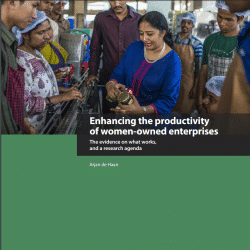
Policy highlights:
- There is concern that economic transformation in developing countries may lead to increasing gender disparities, which can, in turn, hamper economic growth.
- The potential contribution of equal participation of female entrepreneurs to general economic growth is large: 50% of women’s productive potential is underused, compared to 22% of men’s. This gap can be explained by numerous constraints that women entrepreneurs are facing, including 1) lack of access to finance; 2) lower sales and assets; 3) overrepresentation in the smallest and informal enterprises.
- Promoting women’s economic empowerment cannot be seen in isolation of broader gender inequalities and thus requires a multidimensional approach. Policy makers are advised to: 1) establish in-depth and longer- training and mentorship programmes to foster sustainable growth impacts; 2) make addressing constraints to financing a key priority; 3) provide easier access to mobile phones and other technologies; 4) provide women with the legal protection that business registration offers; and 5) promote advocacy initiatives to change laws and enhance the capacity to create a more level playing field for women.










